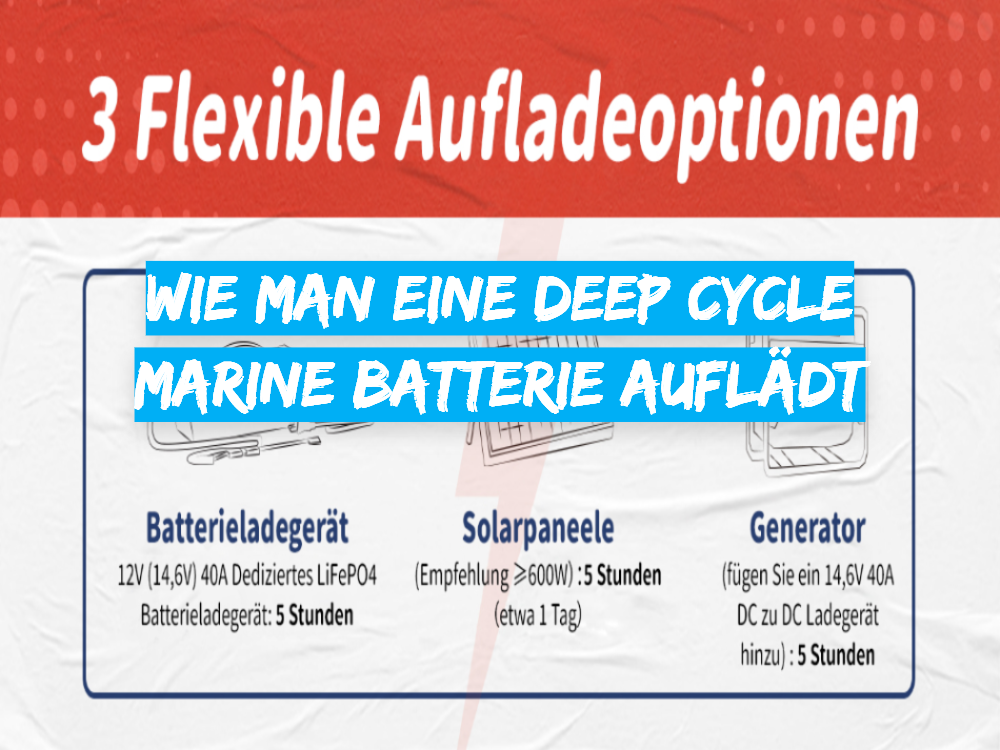Best Smart Battery Charger for Deep Cycle Battery

Deep Cycle Battery is essential for powering a variety of devices, from marine and RV applications to renewable energy systems. To ensure these batteries remain in optimal condition, it is important to invest in a quality smart battery charger. With the market flooded with options, finding the best smart battery charger for deep cycle battery can be a daunting task.
In this article, we examine the key features to consider when choosing a smart charger and highlight some of the best options available.
Information about Deep Cycle Battery
Before we dive into the best smart battery chargers, it's important to understand the unique characteristics of deep cycle batteries. Unlike traditional car batteries, deep cycle batteries are designed to provide constant power over extended periods of time.
They are often used in applications where a constant and reliable power source is required, such as: b in boats, RVs and off-grid solar systems. To maintain their longevity and performance, deep cycle batteries must be properly charged and maintained.

What is a smart battery charger?
A smart battery charger is a sophisticated charger that intelligently and efficiently charges various battery types while providing advanced features for safety, battery maintenance and optimal performance. Unlike traditional chargers, smart battery chargers use microprocessor-controlled technology to monitor and adjust charging based on the specific needs and condition of the battery being charged.
First, let's examine the different charging logic between deep cycle battery and lead acid battery.
Charging logic for deep cycle lithium and lead batteries
The charging logic for deep cycle lithium batteries and lead batteries differs due to their different chemical compositions and properties.

Lithium Deep Cycle Battery:
Lithium batteries require a special charging algorithm to ensure safety and longevity. Normally they are charged in two phases: constant current phase (CC) and constant voltage phase (CV).
- Constant Current Phase (CC) (T1): During this initial phase, the charger supplies a constant current to the battery until it reaches a predetermined voltage threshold, which is typically around 3.65-3.7 volts per cell.
- Constant voltage (CV) phase (T2): Once the battery reaches the voltage threshold, the charger enters a constant voltage mode and keeps the voltage constant while the current decreases until the battery is almost fully charged.
Lead-acid battery:
- Main charging: In this phase, a higher charging current is supplied to the battery until it reaches around 80% of its capacity.
- Absorption charging: In this phase, the charger maintains a constant voltage while the current decreases when the battery is almost fully charged.
- Float charge: Once the battery is fully charged, the charger reduces the voltage to a lower level to keep the battery fully charged without overcharging it.
Key features of a smart battery charger
When choosing a smart battery charger for deep cycle batteries, it is important to consider the specific requirements of different battery types such as lithium and lead acid batteries. Here are the key differences when charging these two types of batteries:
Charging modes: Lithium batteries generally require a different charging profile than lead acid batteries. While lead batteries commonly use charging modes such as bulk, absorption, float and desulphation, lithium batteries may require special charging algorithms designed for lithium chemistry, including stages such as CC (constant current)-CV (constant voltage) charging.
Voltage and current requirements: Lithium batteries have different voltage and current requirements compared to lead batteries. A smart lithium battery charger should be able to provide the precise voltage and current levels required for safe and efficient charging without overcharging or damaging the lithium cells.
Safety Considerations: Charging lithium batteries requires additional safety considerations due to their sensitivity to overcharging and overheating. A smart lithium battery charger should include built-in safety features such as overcharge protection, thermal monitoring and voltage equalization to ensure the safety and longevity of the lithium battery.
Compatibility: When choosing a smart charger, it is important to ensure that it is compatible with the specific type of battery you are using, whether it is a lithium battery or a lead acid battery. Some smart chargers are versatile and can accommodate both lithium battery and lead-acid batteries, while others are specifically tailored to one type.
Understanding these differences in charging requirements between lithium battery and lead acid battery will help you make an informed decision when selecting a smart battery charger that meets the specific needs of your deep cycle battery system.
How to choose the right smart battery charger
Choosing the optimal deep cycle battery smart charger is all about finding one that meets your specific needs. When choosing from the countless options available, consider the following key factors.
Ensure compatibility with your battery type
Certain smart chargers are suitable for different battery types, e.g. b Lithium, AGM and Lead acid battery, while others are only designed for a single type. It is important to choose a charger that suits your battery type.
For lithium batteries, it is recommended to use a dedicated smart lithium charger such as the Timeusb LiFePO4 Lithium Charger to take full advantage of the unique advantages of lithium batteries such as fast charging and enhanced safety features.

Adjust the charger to the voltage of your battery
Choose a battery charger that matches the rated voltage of your battery. For example, if your battery has a 12 volt rating, choose a 12V battery charger. If you need a 24V or 48V charger, consider options like the Timeusb 24V charger for 24V battery. Below is the charging voltage for reference.

Consideration of the ampere output and the charging time
In addition to the voltage rating, battery chargers are also assigned a current rating (A), which must be compatible with the amp hours (Ah) of your battery. Although these two numbers may not match exactly, here are some guidelines for choosing the best smart battery charger in terms of amperage:
The amperage of a charger directly affects the charging speed of the battery. For example, a 12V 4A battery charger charges a 12 volt lithium battery at a rate of 4 amps per hour and fully charges a 12V 12Ah battery in 3 hours.
In general, the higher the A rating of your charger, the faster your battery will charge.
Do not purchase a charger with a current rating that is too low for your battery as this may result in extremely slow charging. For example, a 3A charger would take 30 hours to charge a 100Ah battery. Timeusb lithium battery chargers are available in different sizes: 10A, 20A, 40A, 60A, 80A for charging 12V lithium batteries, 20A for charging 24V batteries, 18A, 25A for charging 36V batteries and 10A, 18A, 30A for charging 48V lithium batteries.
|
Battery voltage |
Charging current (A) |
|
12V |
10A, 20A, 40A, 60A, 80A |
|
24V |
20A |
|
36V |
18A, 25A |
|
48V |
10A, 18A, 30A |
Ensure that the amperage does not exceed the amp-hour rating of your battery as this could cause damage.
Single vs. Bank charger
Let's explore the differences between a standalone charger and a bench charger, especially as it relates to charging batteries or electronic devices.
-
Single charger
A single charger is a device designed to charge a battery or electronic device at once.
Key features:
- Simplicity: Typically straightforward to use with minimal settings or configuration.
- Portability: Often smaller and more portable, making them ideal for travel or personal use.
- Cost: Generally cheaper than bank chargers due to their simpler design and functionality.
Use case: Ideal for single users or for devices that are used and charged individually.
Advantages:
- Easy to use and understand.
- Compact and portable.
- Lower costs.
Disadvantages:
- Limited to charging one device at a time.
- Not suitable for situations where multiple devices need to be charged at the same time.
- Bank charger
A bench charger, also known as a multiple charger, is a device that can charge multiple batteries or electronic devices at the same time.
Key features:
- Multiple charging ports: Equipped with multiple charging ports or slots for multiple batteries or devices.
- Efficiency: Can charge multiple devices at the same time, saving time and effort.
- Advanced features: Often includes features such as intelligent charging, overcharge protection and status indicators for each charging slot.
- Use case: Ideal for environments where multiple devices need to be charged regularly, e.g. b in offices, workshops or for users with multiple devices.
Advantages:
- Can charge multiple devices at the same time.
- May include advanced charging features and protection features.
- More efficient for users with multiple devices.
Disadvantages:
- Typically larger and less portable.
- Higher cost compared to individual chargers.
- May be more complex to use due to more settings and configurations.
|
Special feature |
Single charger |
Bank Charger |
|
Number of devices |
One device at a time |
Several devices at the same time |
|
Portability |
High |
Lower |
|
Costs |
Generally lower |
Generally higher |
|
Complexity |
Easy to use |
more complex |
|
Use case |
Individual use, travel |
Offices, workshop, various gadgets |
Choosing between a standalone charger and a bench charger depends on your specific needs. If you only need to charge one device at a time and value portability, a standalone charger is probably your best choice. However, if you need to charge multiple devices at the same time and value efficiency and advanced features, a bench charger is more suitable.
The best smart charger for deep cycle batteries overall
Thanks to its cutting-edge technology, it is unrivaled when it comes to charging lithium batteries.
The Timeusb LiFePO4 battery charger offers multi-stage protection against over-temperature, reverse polarity, output short circuit and output over-voltage and is CE and RoHS certified.
In addition, the built-in cooling fan ensures efficient dissipation and charging, while the lithium battery activation function BMS protection safely activates lithium batteries.
Visit the Timeusb Online Shop to choose your ideal lithium batteries for RVs, tow motors, golf carts and chargers.



![[Complete Guide] Knowledge of Battery Ampere Hours (Ah)](http://timeusbpower.de/cdn/shop/articles/Solarmodul_oder_MPPT_Ladegregler_mit_Timeusb_Lithium_ionen_Batterie_12V_140Ah.png?v=1716542415&width=1080)
